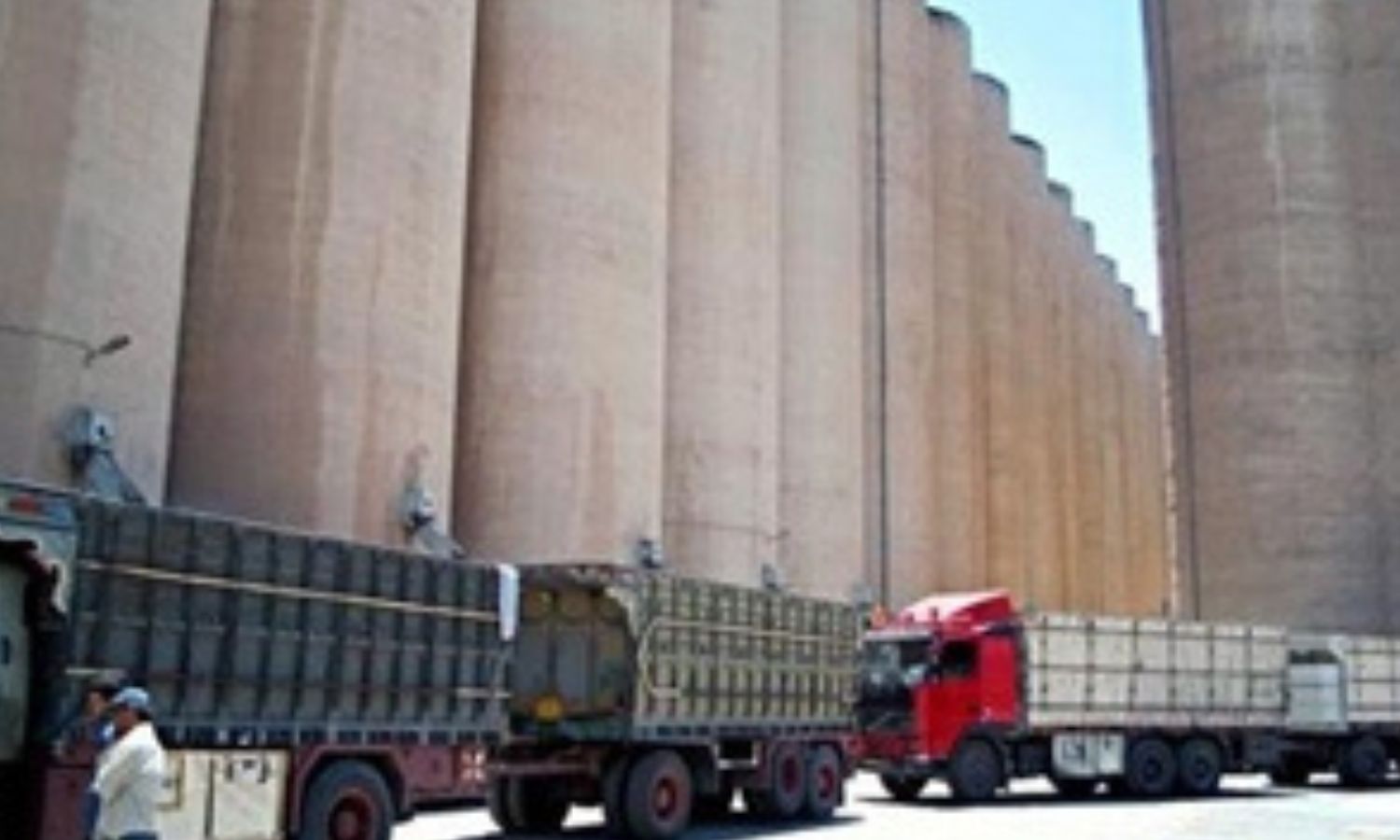



Enab Baladi – Jana al-Issa
On July 7th, Sami Halil, the Director of the Syrian Public Establishment for Grain, announced a joint plan between the Syrian government and Russia aiming to restore and rebuild several destroyed mills and silos in Syria.
The plan includes transferring the necessary Russian technology for the operation and production lines in the Syrian silos and mills. According to this plan, the Tal-Kalakh mill in the Homs countryside, which Russia rebuilt, is scheduled to start service this August. It is one of the largest mills in Syria and will produce about 600 tons of flour per day during its trial phase.
This plan, according to the Director of the Syrian Public Establishment for Grain, aims to increase flour production, meet the country’s needs for the material, and save on transportation and shipping costs of flour between provinces.
Despite the Russian interest in the mill and silo sector starting in 2016, the new plan raises questions about Russia’s goals, especially given that the Syrian regime’s government secures its wheat needs from Russia via various methods.
Besides Russia, Iran has also been active in agreements with the Syrian regime regarding the rehabilitation or construction of silos and mills, suggesting that this sector sees competition between the two sides similar to many other sectors. Two experts link this competition to factors related to preserving the regime’s survival rather than economic interests.
For years, and after the domestic wheat production dropped to levels insufficient to meet the country’s needs, the regime has secured wheat from Russia through various methods, including bilateral agreements rarely disclosed in detail, tenders issued by the Syrian Public Establishment for Grain to purchase wheat, or what Russia sends as “aid” or from the stolen Ukrainian wheat, as revealed by Ukrainian officials and news agencies, despite the regime’s denial.
Syrian political analyst specializing in Russian affairs, Mahmoud al-Hamza, told Enab Baladi that the Russian interest in the mill and silo sector in Syria is directly linked to helping the Syrian regime secure bread, as it is a basic food need.
Considering Russia is one of the world’s largest wheat producers, it likely seeks economic benefits from this sector, thus benefiting both the regime and Russia, according to al-Hamza.
Al-Hamza noted that Russia is currently experiencing difficult economic conditions due to western sanctions, and the war on Ukraine has drained its energy. However, it enjoys high wheat production, making the exportation and trade of the material economically significant.
Since 2013, the Syrian regime has signed many agreements with Iran concerning the rehabilitation or construction of many mills in Syria.
In 2020, the Syrian and Iranian sides agreed with the Iranian Ard Machine company to build five mills in Syria at the cost of 13 million euros per mill.
Syrian political analyst specializing in Russian affairs, Mahmoud al-Hamza, does not see Iranian-Russian competition because Iran does not export grains and is not among the world’s largest grain-producing countries.
Iranian affairs researcher, Diaa Qaddour, believes that Russian influence in the mill sector is greater than Iran’s because the wheat comes from Russia. He noted that Tehran has not seriously attempted to invest in the milling sector on a large scale.
Qaddour agrees with analyst Mahmoud al-Hamza that the issue between Russia and Iran is cooperative rather than competitive, with the goal being the regime’s safety and continuity, a common goal of both Russia and Iran. He told Enab Baladi that the wheat issue affects the regime’s stability and influences loyalist and supportive environments, making it a sensitive area to maneuver.
According to a study by the Jusoor For Studies Center, the regime has signed no less than 126 agreements with Iran between 2011 and 2024 across various sectors, such as energy, trade, health, education, agriculture, industry, communications, and finance.
The study indicates that most of the smaller agreements have been implemented, such as an agreement between the General Company for Mills and the Iranian Safir Nour Jannat company to supply 50,000 tons of flour. These agreements can be considered profitable investments, which pushed Iran to activate them in recent years, including sectors like insurance, mills, agriculture, silos, and grains.
Dr. Firas Shaabo, a professor of financial and banking sciences, told Enab Baladi that the wheat issue in Syria today represents a real dilemma for the regime, as it has effectively lost the strategic stockpile of the material and the areas producing this stockpile heavily in northeastern and northwestern Syria. Consequently, it has become unable to secure the essential wheat needs of the Syrian people, forcing it to turn to local traders or even allies like Russia.
Shaabo pointed out that Russia is one of the top wheat producers and exporters. Syria is part of the market consuming this material, even though it isn’t a large market compared to other countries. From this, Russia tries to dominate the Syrian economy alongside Iran.
Shaabo described the situation between Russia and Iran in the wheat sector as a “sharing” between the two sides, similar to other Syrian sectors like phosphates, within a tangled process between the regime’s two allies.
The researcher interpreted Russia’s desire to invest in the mill and silo sector as a future initiative to establish a starting point in Syria for exporting wheat through the warm waters of the Mediterranean, creating another transit point for Russian products towards Europe or Africa through Syrian lands.
if you think the article contain wrong information or you have additional details Send Correction